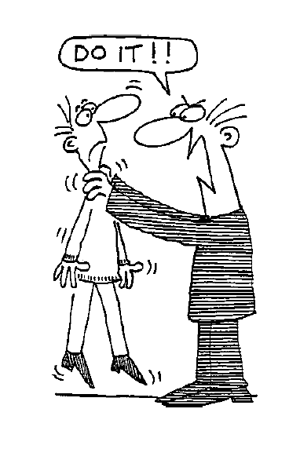Imagine you are an agile coach. If you are already one, the
imagine part is easier. Your goal is to get your team to the top level of agile
development. Let’s get back to: ‘What is agile?’ Agility is the ability to
adapt to any circumstances. Not just the urge to adapt, or only wanting to adapt,
or the ability that you can adapt, but that you are adapting. It’s a process.
You are moving to the circumstances. They are leading. And if you are not
capable to follow, for any reason, you are not being agile.
But, is this really as tough as I just described it here?
Are there no excuses? Let’s try to imagine it in real life, in a real company. There is a difference between you and the world around you. Let me explain. If your company isn’t agile, doesn’t always mean that you are not! If the company has a policy to make his software evolve not based on customers but their own intuition, then they are not agile to their environment. Their software solution is probably dying a slow death. Besides the point I’m trying to make here, if their customers are followers and not depend on their own vision, the company does not have to adapt then there is no point of discussion in agility. What I’m trying to say is that if your environment is not changing, you don’t have to. You maybe have the ability to adapt, but it’s not being triggered. The question is, are you agile if you got the ability to adapt when you don’t need to?How do you know you’re agile?
Now that’s a good question! How do I know that I’m agile while I’m not given a change to be? Is there some way I might lose my ability to adapt when I’m not challenged? I think you can actually. Fortunately we live in a society which breaths on opinions. So if you are not changing in the way you develop your company’s software, the only possible cause there can be… You’re right, it’s your company! Go ahead, blame them. They are taken away your gift in adapting. (It only complies if you are willing to be agile of course.)So if your team is agile minded and you don’t get any step further, what do you do?
This is the biggest challenge of all. Make the company
agile. Now that’s a big task to do. How on earth are you going to do that? You
only are an agile coach, or a developer. (With developer, I mean any the people
in the development team.)
As a company why do you need to adapt to y
our environment?
What’s the use? What is the problem if you don’t? In what
kind of trouble are you getting yourself into? If you’re environment is still
in tune with your software, why should you worry for the future when things are
going to change? What triggers you to react on changes and how do you prepare
yourself for something you haven’t encountered yet?
You have to find out what likely is going to happen in the (near) future.
- The customer waits for a long time to get the functionality they want. (The customer wants it by tomorrow at least.)
- The customer doesn't get the long-awaited features at all. (Because the company thinks the customer wants something the company came up with.)
- The quality is not good enough. (The development team didn't quite catch the goal or reproducible examples/scenario.)
- The features delivered are not intuitive. (The developers do not feel what the customer wants and their idea of functionality, location of buttons, labels or workflows do not correspond the customers ones.)
- The company is creating a risk by implementing long going software trajectories that runs out of alignment with customers’ expectations. (If you don’t deliver incremental software, you do not get feedback on time but weeks or months later and then the time you spend on that changes can be thrown away.)
- The customer gets irritated. (When the functionality is not what they expected, they assumable go the next software provider.)
- The Employee is getting frustrated. (Because of all the bugs, angry customers and atmosphere.)
- The employee is going to be dumb. (He is not challenged anymore and it’s more like working on an assembly line, instead of his vivid empathy or imagination.)




